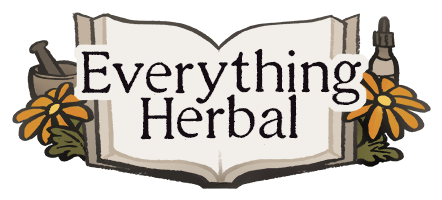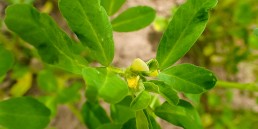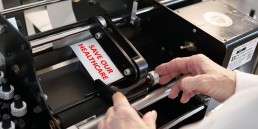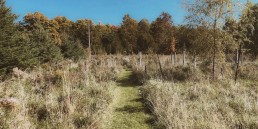Consumers in the United States spent an estimated $9.602 billion on herbal dietary supplements in 2019, an 8.6% increase in total US sales from the previous year, according to the American Botanical Council’s (ABCs) 2019 Herb Market Report.
And this is expected to increase for 2020 and 2021. Yet 95% of these sales would not exist without the work and devotion to their craft of the herbalists of the recent past. Herbal medicine today truly stands on the shoulders of all those who came before.
In this blog we will look more into some of these herbalists, Starting today with one of my favourites Mr Chalid Ottway, a true descendant and student of Aviccena – one of the greatest herbalists who ever lived. (To learn more about Aviccena, see Mr Ottway’s short biography of him at the end of this blog.)
The Beginning
Chalid Ottway was the descendant of a notable Arabian family, dating back many generations, all of whom were distinguished for their knowledge of medicine and service to humanity. Looking to expand his horizons and to bring his skills and gifts to a new audience, he arrived in Toronto, Canada in the 1920’s.
Canadian medicine in those times was very different from today of course. As was the culture. As an “Arab” Mr Ottway had to deal with rejection and contempt as he tried to present his methods, remedies and formulas to a suspicious Canadian public. The medical establishment of the time ignored him, the people had no time for him. He had no social status and had arrived in Canada with virtually nothing. What was he to do?
Mr Ottway, a deeply spiritual man and devoted Muslim in the very best sense, decided to fall back to the original methods of his historical mentors. He set up a stool and box, that he carried around on the corner of Canada’s busiest streets – Yonge and Bloor in Toronto. A hand written sign offered to cure corns of the feet free of charge and he sat and waited for his first “customer”.
Corns can be painful, and back then many of the abundant patent remedies were useless. I am sure that many passers-by were willing to try anything. And of course, you guessed it, his remedy worked spectacularly!
Word soon spread of the “little Arab” on the corner, and people began asking him for more remedies. Crowds gathered around, forcing him to seek out proper premises, which he found on Danforth Avenue in 1930, just east of Yonge and Bloor.
From then on Mr Ottway’s business thrived. He produced multiple products at his store and sold them all over Toronto. As his fame spread he set up a mail order section at his store and shipped his products all over Canada. Some of his more famous products included Nerviton tablets (obviously for the nerves) and his Herbiton tonic and pick-me-up. Check out the pics of his product labels!
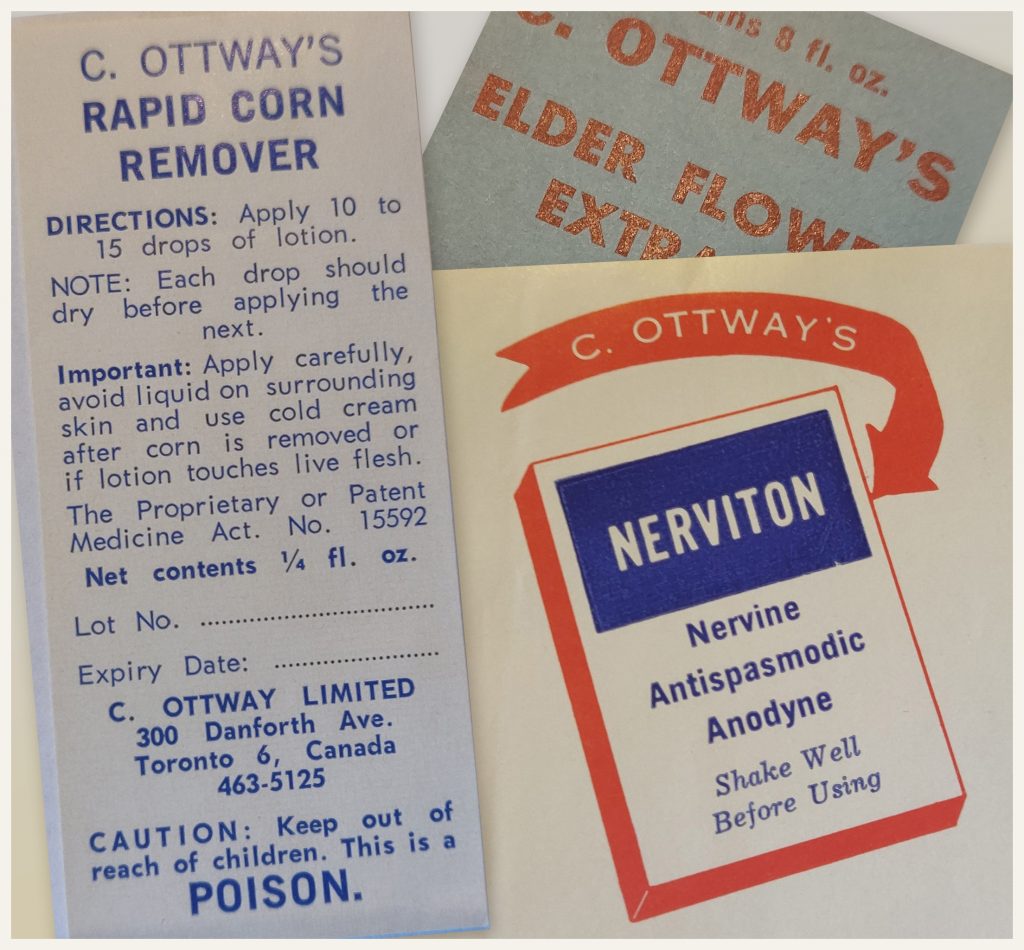
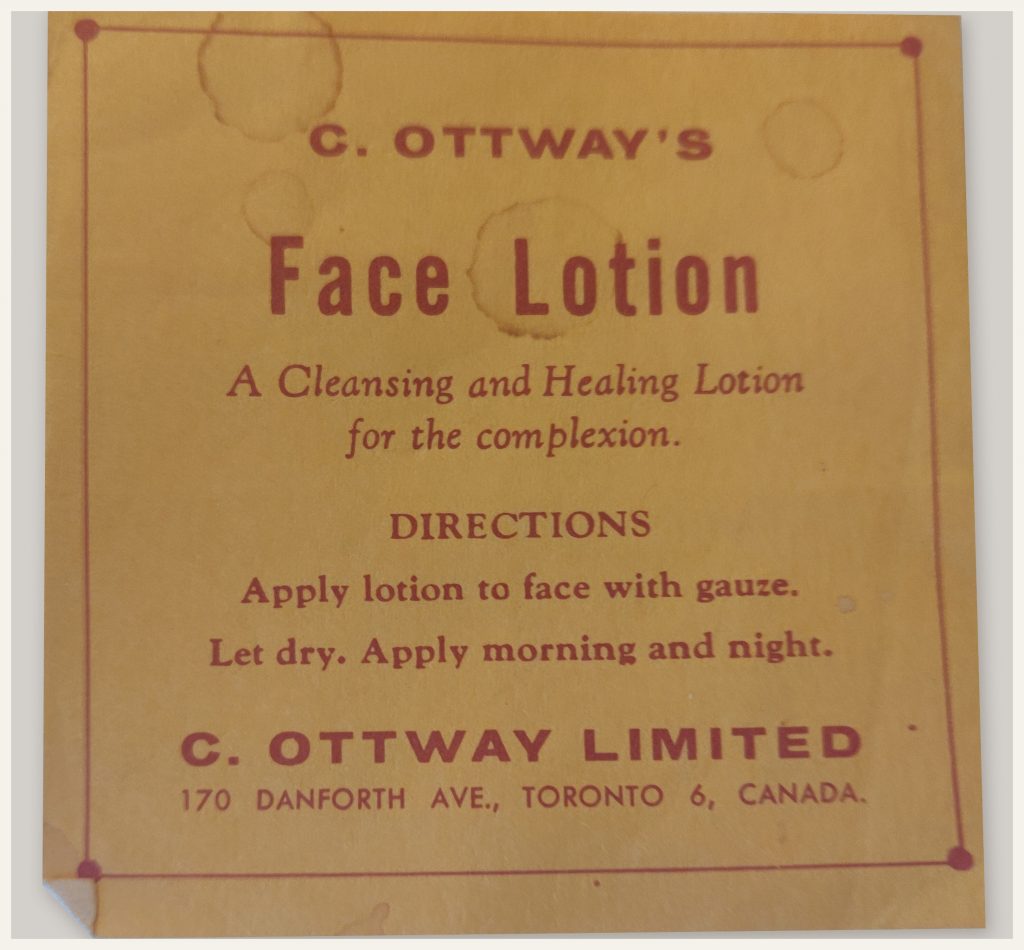
(Photos of these labels taken by Nick Faunus)
Mr Ottway became a popular and highly regarded Toronto character and was featured in the newspapers and on the radio. On one occasion he was taken to court for “illegally practicing medicine” but the public outcry against this was so great that the court summarily dismissed the charge, and he was never charged with anything again. Mr Ottway was also generous in his support of the poor and disadvantaged, giving free remedies and advice wherever it was needed.
Once, when he heard of a small boy suffering badly from boils, he offered to take care of him – and the boils cleared up in five days! After seeing the suffering that the poor boy went through, he vowed never to charge for the formula and gave it away freely to whomever needed it. The treatment consisted of only five capsules!
Along with Thuna’s (that’s another blog!) Ottways was the primary source for herbs in Toronto, up until the early eighties. Mr Ottway died peacefully in his sleep at 70 years but the products were still being made by his assistant Mathew Cameron, until he retired in the late eighties. The business has changed hands several times since then and still exists in a different location, but is still on Danforth Avenue. However, the unique products are gone and are no longer made there, although the store carries a wide selection of modern high quality products.
A personal note …
Mr Ottways story appeals to me for many personal reasons. I too arrived in Canada with nothing but my bag of herbs, and had to go out on the streets to sell them, in the early eighties, to live and eat. It was a struggle at first though always fun and fulfilling, but like Mr Ottway I never doubted the power of the herbs and my faith in them was rewarded many fold.
Most importantly I met my wife there in 1984 (she was working in the dispensary in the back). She heard me talking to the owner about some herbal products I was hoping to sell and caught me on the way out. She barely spoke but handed me a piece of paper, which I looked at when I arrived back at my rented room. It was her phone number, and we were married within a year! This year marks our 36th anniversary.
Isn’t it amazing what herbs can do for you!
We are always interested in learning more about Mr Ottway (and other past herbalists). If you have a story about him please get in touch with us here at hello@everythingherbal.ca!
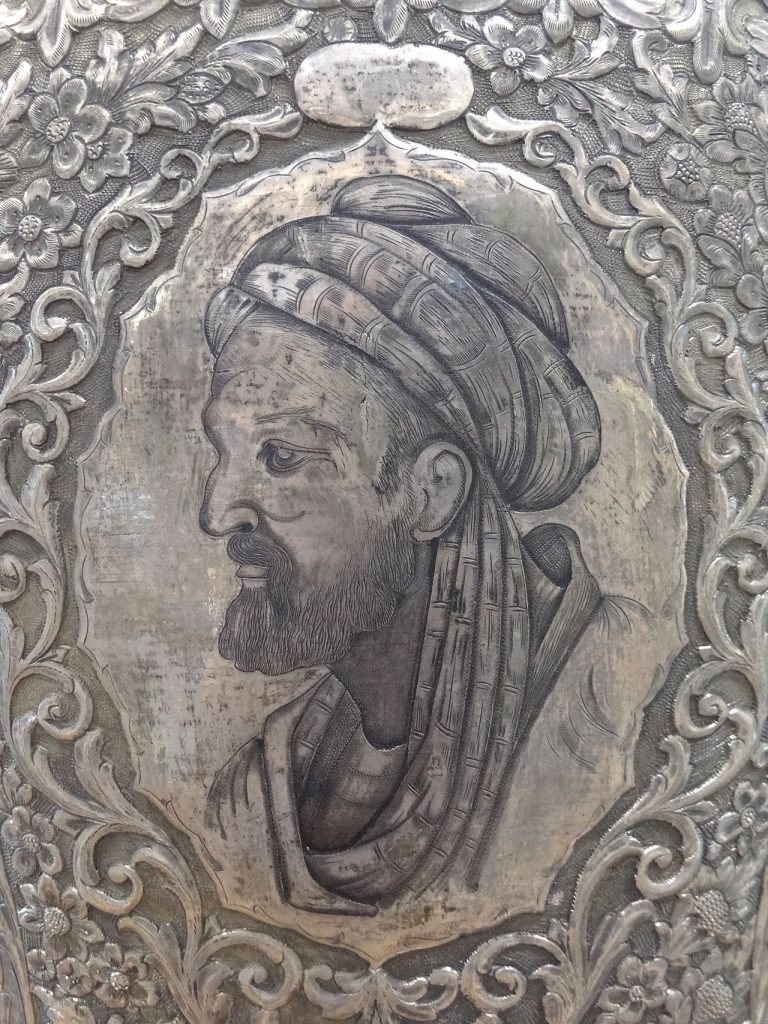
The Prince of Physicians
by Chalid Ottway.
In the region of Ibn Mansur, Amir of Bokhara, Arabia, in the year 980 A.D., in the town of Afshena, the first son of the Collector of Taxes was born. This boy, Abu, Ali Al-Husain lbn Abdallah lbn Sena, whom we shall call by his better known name, Avicenna, was destined to a career of undreamed of brilliance. He was to give to mankind new and superior methods for the prevention and treatment of disease that were to revolutionize the standard practices of his time, and to leave behind him the illustrious title. Prince of Physicians.
When Avicenna’s younger brother was born, his parents moved to Bokhara, which was then the chief city of the Moslem world, famous, even before its conquest by the Saracens, for its culture. Here, Avicenna was placed under a noted tutor, and soon proved himself a most precocious student. At the age of ten, he had not only mastered the Koran, but the Arabian Classics as well, and his tutor made no secret of the fact that the position of pupil and teacher was now reversed.
With an ambition that brooked no denial Avicenna continued to study medicine, astrology and kindred subjects, under the tutelage of the wandering scholars who, at that time, made their living by attending the sick and imparting their knowledge to the younger men. It was not long before Avicenna discovered that in most cases, his so-called teachers were nothing more than charlatans, or that his own learning was far in advance of theirs.
Aided only by the written works of others, he continued to study the higher branches of the Arts, and assiduously put into practice his medical knowledge. History records that he read “Metaphysics by Aristotle” forty times in an endeavour to fully understand this ponderous work, but in spite of this continual reading, its meaning remained hopelessly obscure, until for a few cents, he purchased a commentary written by Farribi. With this simple little aid, he obtained a complete mastery of the subject matter contained in Aristotle’s works.
At the age of sixteen, he had mastered medical theory and according to his own accounts, perfected his methods of treatment and preparation of remedies by continual attendance upon the sick without charge.
At the age of seventeen, he was appointed Chief Physician to the Amir, after having cured him of a dangerous illness that had baffled the noted doctors of the time, and was further rewarded by being given access at all times to the wonderful collection of books in the Royal Library.
A few years later, the Library was totally destroyed by fire. Avicenna’s enemies accused him of arson, saying that it was his intention to conceal for all time the sources of his marvelous powers and learning. This contention, however, was never proved.
All through the period in which Avicenna lived, his country was riven by feuds and war. In the year 1004 the Saminid Dynasty came to an end. Declining the offer of the position as physician to Mahmud the Ghasnivia, he began his wanderings from town to town in Khiva and Khorasan seeking an outlet or market for his talents.
During the siege of Darlem, in 1012, Avicenna suffered so from privation, that he was taken seriously ill. When he recovered, he sought the assistance of a friend and settled in Joryan, near the Caspian Sea. There, he lectured on logic, astronomy and medicine, and wrote several treatises, in addition to commencing his famous “Canon of Medicine”.
The constant feuds of those in power, forced Avicenna to travel west, and he stopped at Rai, in the vicinity of modern Teheran. Eventually he settled in Hamadan, where he continued his prolific writing, completing thirty more of his works, and his Canon of Medicine, comprising in itself five volumes, which were dictated and explained to his pupils day by day.
He was consulted by the Amir who afterwards appointed him to the office of Vizier. This appointment caused much jealousy, and roused Avicenna’s enemies to plot against his life. An order for his execution was signed by Shamus Addaula, and Avicenna was forced to hide in the cellar of a Sheik’s house for forty days, at which time a pardon was obtained by royal command in order that he might attend the Amir who was very ill.
War, prison and privation, coupled with the intense mental strain of overwork, punctuated by strenuous bouts of material pleasures, undermined Avicenna’s constitution and depleted his stamina.
During one of the ever recurrent campaigns, he was seized on the battlefield with a serious stomach trouble. He applied to himself remedies that were so strong that he had to return to the city. A similar seizure at a later date warned him that the disease was gaining ground. He resigned himself to his fate, realizing that his weakened system could not stand the arduous regimen necessary to check the disease.
With characteristic thoroughness he bestowed all his goods upon the poor, and freed his slaves. The latter part of his days was spent in listening to the reading of the Koran, from which he derived much comfort, and thus in the month of June, 1037, Avicenna passed from this world. But the works of this Prince of Physicians lived on, and became the guides to the medical study in the European Universities from the twelfth to the seventeenth century, and are again, in the writings that will come*, carrying on their task of enlightenment and mercy.
A Note on Pronunciation
It is felt that it is wise to give here a literal translation of Avicenna ‘s name, since the one with which we are familiar is in reality the English corruption of his Arabic nickname. It is well to keep in mind too, that each Arabic word has several meanings, so that a word may appear in its translated form at one time in one manner, and at another in different manner.
Abu Ali Al-Husain lbn Abdallah lbn Sena
Abu – Title of respect such as our Sir.
Ali – His father’s given name.
Al – Roughly translated, in this case means, of.
Husain – The Persian calling of the family name, which is in Arabic, Nesaif.
Ibn – In this case, means son.
Abdallah – Avicenna’s given name.
Ibn Sena – Son of Abyssinia, or coming from Abyssinia.
It was by this name that our Doctor and Philosopher was known, that he might be distinguished from others of the same family name, and it is from this nickname, Ibn Sena that the English corruption, Avicenna comes.
So, literally, we have Mr. Ali Al Husain’s son, Abdallah, who comes from Abyssinia.
*Note: I intend to feature extracts from Chalid Ottway’s writings in future blogs, including some of his wonderful formulas!
